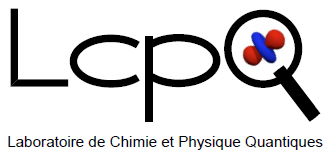TOWARDS HIGHLY ACCURATE ELECTRON AFFINITIES OF MOLECULES
THEORETICAL CHEMISTRY AND COMPUTATIONAL MODELING

Lab: LCPQ
Duration: NanoX master Internship (8 months part-time in-lab immersion)
Latest starting date: 15/10/2025
Localisation: Laboratoire de Chimie et Physique Quantiques
118 route de Narbonne
31062 TOULOUSE - FRANCE
Supervisors:
Fábris KOSSOKI fkossoski@irsamc.ups-tlse.fr
This research master's degree project could be followed by a PhD
Work package:
The electron affinity is the energy difference between a neutral molecule and its negative ion counterpart [1].
This fundamental property controls the electronic stability of the negative ion and can be used as a predictor of
molecular reactivity. It is thus not surprising that accurate determination of molecular electron affinities has
always been of great relevance in physics and chemistry. The calculation of meaningful electron affinities is
complicated by the fact that it is a small difference between two much larger numbers. Therefore, reliable values
can only be obtained if basis set effects as well as correlation effects, for both neutral and charged species, are
sufficiently well described. For most purposes, this means reaching uncertainties below 1 kcal/mol (equivalent to
around 0.04 eV), the so-called chemical accuracy. However, no theoretical predictions have been able to
systematically reach chemical accuracy for molecular electron affinities.
This project aims at doing so. To reach this level of accuracy, we will rely on the selected configuration interaction
(SCI) method developed at LCPQ [2]. By a clever selection of the most important electronic configurations, this
state-of-the-art method allows us to systematically approach the limit where correlation effects are fully
described. Thanks to its controlled precision, SCI has been extensively employed in the past 6 years to produce
chemically accurate vertical excitation energies of various types of systems, including organic molecules, radicals,
and even transition metal diatomics (see Ref. [3] and references therein). Very recently, SCI was employed for the
first time to calculate chemically accurate ionization energies of small molecules [4].
The next step and the goal of this project is to obtain highly-accurate electron affinities of molecules. In the first
part, we will perform SCI calculations for around 20 small organic molecules. In the second part, the calculated
electron affinities will be taken as reference data to gauge the performance of more approximate quantum
chemistry methods like state-specific coupled-cluster and equation-of-motion coupled-cluster. Both the reference
data produced and the benchmark results are expected to be extremely valuable to the theoretical chemistry,
physical chemistry and molecular physics communities. This internship could be followed by a PhD, subject to
funding approval.
References:
[1] J. C. Rienstra-Kiracofe, G. S. Tschumper, H. F. Schaefer, S. Nandi, G. B. Ellison. Chem. Rev. 102, 1, 231-282 (2002).
[2] Y. Garniron, T. Applencourt, K. Gasperich, A. Benali, A. Ferté, J. Paquier, B. Pradines, R. Assaraf, P. Reinhardt, J. Toulouse, P.
Barbaresco, N. Renon, G. David, J.-P. Malrieu, M. Vérli, M. Caffarel, P.-F. Loos, E. Ginger, A. Scemama. J. Chem. Theory
Comput. 15, 6, 3591-3609 (2019).
[3] D. Jacquemin, F. Kossoski, F. Gam, M. Boggio-Pasqua, P.-F. Loos. J. Chem. Theory Comput. 19, 8782 (2023).
[4] A. Marie, P.-F. Loos. J. Chem. Theory Comput. 20, 11, 4751-4777 (2024).
Areas of expertise:
Theoretical Chemistry
Required skills for the internship:
The student should have a strong background in physics or chemistry and good knowledge of
quantum chemistry methods.
